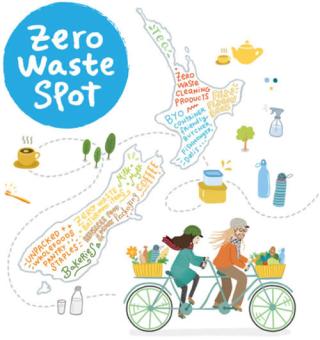Whakatāne District prides itself as clean and green. To help keep with this image, there are a number of ways that we can help protect our environment.
The Council is committed to reducing waste. The policy document which sets out waste reduction initiatives is the Waste Management and Minimisation Plan 2015.
- Reducing rubbish around your home
- Some easy steps to reduce your rubbish
- You can help to save our natural resources
- Become a smart shopper
- Avoid landfills
- Greenwaste Collection (Fortnightly Service)
Reducing rubbish around your home
We view waste as something we do not have a use for, but some of it can often be viewed as a resource that we throw away. The Council is committed to recycling and reusing as much of our waste as possible and ultimately reducing the amount we send to landfill.
By reducing your rubbish you can:
- Reduce demands on natural resources
- Reduce the amount of material disposed in landfills
- Reduce disposal costs for the Council and ratepayers
- Save money on weekly grocery bills (products with less packaging cost less)
- Use products you’ve recycled yourself, such as compost and paper, instead of buying them
Some easy steps to reduce your rubbish
The following steps can dramatically reduce what ends up in your rubbish bag each week:
- Buy products that use less packaging (economy size, refills or concentrates)
- Buy products packaged in recyclable material, such as paper, cardboard, glass, aluminium, tin or plastic containers - not plastic film
- Avoid or reduce the use of disposables (razors, pens, plates and cups)
- When buying only one or two items, tell retailers "No bag please" and bring your own cloth bags to the supermarket for groceries
- Buy products with recycled content in them - this means fewer natural resources are used, and there is less waste produced in the long run
- Re-use boxes and jars for storage, and keep wrapping paper and ribbons for future use
- Think before you throw something away - donate re-usable toys, books and clothing to charities or your local 'Op Shop'
- Take old appliances, furniture and bikes to a second-hand shop rather than the transfer station
- Collect paper, cardboard, tins, cans and plastics in your yellow lid bin for the fortnightly recycling collection
- Use your recycling crate for glass bottles and jars
- If you have a garden, you can compost your grass clippings and tree prunings as well as fruit and vegetable scraps
- If you don’t have room to compost, use a worm bin indoors to dispose of kitchen scraps
You can help to save our natural resources
Natural resources are ingredients such as trees (renewable) and minerals (non-renewable) that make up all the products that we use, such as paper and aluminum cans. If we reduce the amount of things we buy and re-use them as much as possible before throwing them away, we use fewer renewable and non-renewable resources, which saves us money and is good for the environment.
If we recycle what we can’t use anymore, we save resources because the recyclable materials replace some of the natural resources, including water and energy, which we use to make new products.
Become a smart shopper
- Avoid junk mail
- Buy products with less packaging (economy size and concentrates)
- Donate or resell used items (clothing, toys, books, appliances, furniture, sports equipment)
- Buy products made with recycled content
- Shop at environmentally aware businesses
- Buy long-life products, not disposables
- Choose re-useable shopping bags
- Re-use products or packaging (refills, wrappings and second-hand purchases)
- Buy products with recyclable packaging
- Buy less toxic products or use natural alternatives (cleaners and pesticides)
 Want to find local businesses and community groups who can help you reduce your rubbish?
Want to find local businesses and community groups who can help you reduce your rubbish?
Check out the Regional Zero Waste Guide / interactive shopping map by "The Rubbish Trip" team.
Avoid landfills
A landfill is land where rubbish (solid waste) is compacted and buried. It should be designed and managed so that no liquid or gas can escape and harm our environment. They cost a lot of money to build and maintain.
After Council has recycled, reprocessed or re-used as much of our waste as possible, what’s left is disposed of in a landfill. By reducing the amount of waste sent to landfill, we reduce the haulage and disposal costs.
Greenwaste Collection (Fortnightly Service)
Whakatāne District Council provides a fortnightly greenwaste collection service.
To find out what day your greenwaste collection is, use our waste collection day search.